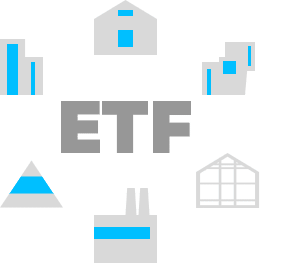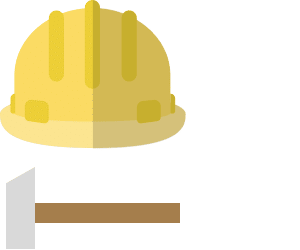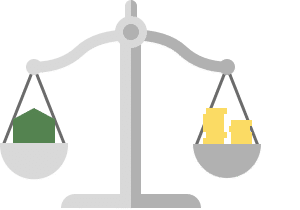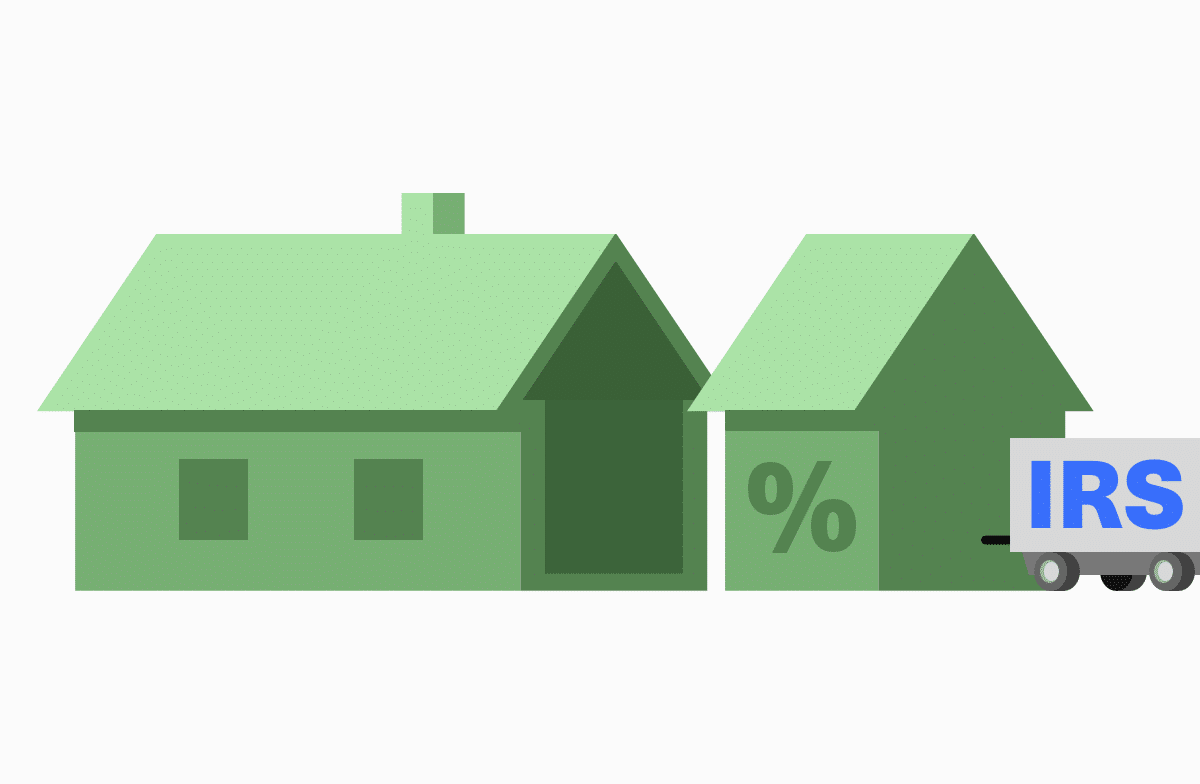In 2018, homes increased in value by an average of 4.7% across the U.S, according to CoreLogic. With all the hubbub surrounding the housing market, it’s no wonder some people are starting to ask, “Why should I invest in real estate?"
As it turns out, there are plenty of reasons to invest in real estate. Unlike typical securities, which are often tracked digitally, real estate is an investment opportunity that allows you to hold a financial interest in a tangible asset. Real estate investing provides numerous avenues for potential returns. For example, investors can potentially leverage real estate as an additional source of income by leasing property. Real estate investments are still risky, as property values can drop, natural disasters can strike, and units can stand vacant, but it's a potentially great way to diversify your portfolio beyond stocks and bonds.
Read more about how to invest your money.
Buying property
Buying property is almost as straightforward as it sounds. It involves a contract or legal deed and ownership of a specific piece of land or a building. Real estate investors often purchase property in areas expected to appreciate in value, thereby allowing them to earn on their initial payment if that expectation is met.
That said, there are numerous options and property types to consider when purchasing real estate.
Your house 
Buying your own home is one of the most popular ways for people to invest in property. It’s convenient (it’s where you live, after all), often more cost-effective than renting, and the owner (read: you) can control how to maintain or eventually sell the property. Like all markets, the housing market can rise and fall and a variety of factors can greatly influence the price of sale. This is why it’s important to get advice before you buy a home. You should do research on neighborhoods, markets, and the overall costs incurred to own and maintain the property, as buying a personal home is generally a long term investment.
House flipping
House flipping, buying a property to fix it up and sell it at a higher price later, is a popular option for people looking to make a quick profit from a property. It’s definitely a hands-on project, and it can be one of the quickest ways to earn on your real estate investment. You need to do the work (or contract it out for an added expense) and have ample credit to purchase and renovate the property. While house flipping makes for great reality TV, it’s never a guarantee that a renovated property will flip at a higher price.
Rent-to-own
Rent-to-own offers buyers an alternative to securing a mortgage when purchasing a house. In a rent-to-own agreement, buyers rent a home for a certain period of time with an option to buy it before the lease expires. All parties agree in advance to the value of the property. This allows buyers to “lock in” prices at the current market rate. Sellers can then profit off of monthly payments until the eventual sale of the property. However, rent-to-own can also be used as a predatory rental method for buyers with bad credit and should be researched carefully.
Rental properties
Buying a property to rent it out is one of the most popular ways to earn passive or semi-passive income. It allows investors to own a property and charge a premium market rate for others to live or work in that space. This covers property-related expenses and can be a great way to earn while the property appreciates in value. The downside, however, is that the property will be used by renters, and good tenants can be hard to find. Further, if the market is soft for the available space, it may sit empty. Owners should plan for additional expenses like repairs, insurance, landlord or management fees, and other costs that come with rentals.
Vacation property
Vacation properties can be a great way to invest. You can earn income on that property if it appreciates in value over time. You can also earn on rentals, which can be priced at a premium depending on the location of the vacation home. On paper, this can seem like a win-win situation: your money goes into a home that appreciates in value and you can rent it out, plus you get a sweet spot for holidays. That said, the market for vacation properties tends to have higher value swings, and vacation properties typically come with additional taxes and up-keep costs.
Airbnb and short-term rentals
With short-term rental apps such as HomeAway and Airbnb changing the face of the hospitality industry, now might be a good time to start thinking about investing in a short-term rental. For many, this is a great way to make money off of the spare room you never use. Just be sure that you can legally operate one — cities like NYC and LA have strict regulations. You will also need to pay taxes on income earned from these activities.
Commercial or non-residential property
Commercial properties are retail buildings, offices, apartment complexes, mixed-use, and industrial buildings. Each building type comes with different considerations. Investments in commercial real estate can have big earning potential and typically have much higher returns than investments in single family homes. However, unlike a home, commercial real estate may involve multiple leases or contracts with vendors, complex maintenance issues, and public safety requirements. This typically involves more money upfront and can cost more to maintain.
Investing without buying property
If you aren’t interested in buying property, or don’t have the capital to put into a home, you can still invest in real estate. There are several different ways to invest without ever actually owning property.
Real estate investment trusts (REITs)
REITs are companies that finance and often operate income-producing commercial real estate. There are two main types of REITs: equity REITs and mortgage REITs. REITs can be publicly traded or privately owned. Investors can buy shares and get paid dividend distributions based on the amount they invested. According to U.S. federal income tax, REITs generally pay out an amount equal to at least 90% of their taxable income to shareholders. By putting money into the fund, REITs offer investors an opportunity to earn on a diversified portfolio that is managed and run by the trust.
Real estate mutual funds
Real estate mutual funds are a collection of professionally managed pooled investments that go towards a variety of vehicles, including stocks and bonds. They offer a fairly low-risk, low cost, and reasonably safe starting point. Real estate mutual funds tend to be a bit more diversified than REITs, as they typically focus on publicly traded companies. Unlike REITs, with mutual funds, you are investing in the company managing the fund, as opposed to the portfolio itself.
ETFs
Exchange-traded funds (ETFs), which primarily operate in U.S. markets, invest in multiple property-owning companies at once. They are pretty similar to mutual funds in that they provide broad diversification in a portfolio and have fairly low management costs. Many ETFs also own stakes in REITs. Some notable ETFs that own stakes in REITs include those managed by Vanguard, Charles Schwab, and iShares.
Wholesaling
Wholesaling is similar to house flipping. The strategy here is to contract a distressed property from a seller and then assign the contract to a willing buyer. The wholesaler and the seller do not actually exchange any money. Rather, the wholesaler earns revenue by acting as a middleman and finding a buyer who is willing to purchase the property at a price higher than the seller originally asked for. Every state has their own laws and regulations surrounding wholesaling so be sure to do your research first.
Online real estate investment platforms
Online real estate investment platforms are crowdfunding’s answer to real estate investing. You can contribute a small amount of funding to a larger pool backing a project. Like investing in startups on Republic, you’ll want to invest in opportunities you trust and areas you know about.
Real estate partnerships
Sometimes it’s better to invest with a partner. This can be a family member, friend, or fellow investor. In this case, you share the cost with your partner(s). This can be a useful approach if you are looking to buy property that you can’t afford by yourself, or if you want to share management or landlord responsibilities with someone else. It can be a great way to share the cost (and risk), but it’s important to have roles, funding amounts, and other aspects of the partnership agreed upon in advance and backed by a contract.
Real estate service companies
Real estate service companies provide advisory, design, marketing, and other services to the industry. They don’t necessarily own or manage property, but often help build or market it. This provides investors with a way to back companies rather than specific projects or properties.
Home construction companies
Another alternative to investing directly in a property is investing in construction companies. This can be a good way to back a team or project. What you’re banking on is the value of actually constructing the homes, not the homes or properties themselves.
Become an appraiser
Real estate appraisers estimate the market value of properties. Becoming an appraiser can be the start of a great career and can give you insight into the broader market. Appraisers are required to get certified at the state and national level, but gaining the knowledge needed to work the market can pay off in a big way.
Become a real estate agent
Real estate agents earn revenue for each property they sell or rent. Depending on the market, their commissions can be huge, but like appraisers, they need licenses to operate. Agents can also work for brokers, which take fees from commissions for brokering the property. Starting a brokerage firm is another option, but it can be expensive and also requires training and licenses to operate.
How much money do you need to invest in real estate?
As with any investment, how much you invest depends on your existing capital and your investing interests. Traditionally, a lot more money is required upfront to purchase a property. If you don’t have enough for a down payment or mortgage, that’s OK — there are options with REITs, REMFs, and online investment platforms. Remember, you shouldn’t put more in than you are able to risk losing.
Read more about how to invest in mutual funds.
What are the tax implications?

In the United States, investing in real estate traditionally receives preferable tax treatment due to public policy support of property ownership. For example, costs incurred running a rental property can be deducted as income expenses. Real estate taxes are complicated, though, and differ from state to state. Some things to consider:
Capital Gains Tax
A capital gains tax is a tax owed when a property is sold. You can reduce this amount by deducting the capital losses that happen if/when the property sells for less than you bought it for. Duration of ownership and type of property (vacation, residential, commercial, and so on) will also impact your capital gains tax. For example, if you hold the property for less than a year, you will owe a short-term capital gains tax and the IRS will tax your profit from that property as income.
Rental income tax
While you must declare rental income on your taxes, you can deduct expenses you incur while maintaining your rental property. This can include upkeep, maintenance costs, and other aspects of maintaining the property for renters.
When should you start investing?
It’s never too early to invest in real estate. In fact, there’s a clear advantage to starting early, as it often takes years for property to appreciate in value.
Read more about how to start investing.
Here’s what you need to do before you start investing in real estate:
Get your finances in order. It sounds obvious, but before you do anything, outline how much you’re willing to put into an investment. It’s important to understand what you can afford to put away and, in the worst case, potentially lose.
Get to know the local housing market. Research, research, research! Where you purchase property will have a direct impact on your potential payout. Local newspapers and magazines are a great source of information, as are online platforms like Zillow. Try to understand which types of properties sell in a specific market, and why they are selling. From there, you can make informed choices that help maximize your return.
Keep it simple. Don’t get caught up in trying to have too much at once. Figure out which property types appeal to you and go from there. You don’t need to manage multiple properties to be successful; only invest in what you are capable of handling.
Diversify. Don’t just invest in real estate. It should be part of a well-balanced portfolio that also includes mutual funds, bonds, stocks, startups, and other assets to help reduce risk and increase reward.
Stay local. With the exception of vacation property, don’t buy somewhere you’re not, especially if you’re going to actually own the property. You’re going to want to be somewhere nearby where you can easily check in on your investment.
Be prepared for the costs and risks. Understand the tax implications, market patterns, and local pricing averages before buying. There are costs to real estate investing in addition to your initial amount. Make sure you’ve factored these into your calculation and be prepared for any potential risks along the way. Only invest what you are comfortable losing.
Start small. You don’t need to start by buying a home or building. Try investing in a REIT or real estate mutual fund. Talk to others who have previously invested and see what they learned. You don’t need to go all-in from the beginning. Take your time and make informed and careful decisions.
Try “house-hacking” or have tenants help pay for your property. You can do this by renting out a bedroom on Airbnb or another platform, living in one part of a multi-unit property, or living with roommates. If you buy your house and rent out three bedrooms, you can minimize your living expenses and make money at the same time.
Buy a multi-family building and sell off the units later. This is house hacking for commercial real estate: buy a multi-unit property now and leverage additional spaces to earn while your property increases in value.
Flip it. If you are interested in house flipping, find a fixer-upper in a good market and take on your first project. You’ll need to invest more into the property, but this can be a great (and quick) way to earn when you invest in real estate.
Hire a real estate agent. When in doubt, trust the pros. Establish a good relationship with an agent to better understand the market from a professional point of view. They may have advice you haven’t heard before or can show you homes before they hit the market.
Is real estate a good investment?
The question of whether anything is a good investment for you should be answered with a conversation with your tax/financial professional. Everyone has a unique financial situation, and you should always get advice from a professional before you invest a single dime.
Next, it’s worth knowing that adding real estate assets to your portfolio offers a great way to diversify said assets. You might not earn as big as you could on the stock market or with startups, but it could still offset potential losses incurred elsewhere.
Most importantly, you need to do your research on the real estate market. Each real estate market is different —New York is different from, say, Des Moines — and returns in real estate differ based on location, asset type (a physical location vs. a REIT or real estate ETF), and other factors. If you’re buying a location, you have to pay for upkeep. If you’re buying into a bundle of locations, there are numerous factors that could dictate the rise and fall of value of each location.
When doing research, be sure to pay close attention to real estate trends. Could climate change impact an area? Are consumers buying fewer houses or renting more? What are the averages of real estate-focused ETFs when compared to the S&P 500 or other types of investments? Most importantly, do the benefits of real estate investing outweigh the risks for your specific style of investing?
If you do your research and decide to become a real estate investor, you’ll enter a world with millions of other investors. Your initial investment could turn into something much larger. As with all investing, there’s always a risk, but if you seek help and do your research, the chances are favorable that it will pay off.
This educational article is provided by Republic to help its users understand this area of the market, it should not be construed as investment advice as it is impersonal, disinterested and was produced by Republic for Republic’s users, without remuneration received or expected.




 Oops! We couldn’t find any results...
Oops! We couldn’t find any results...







